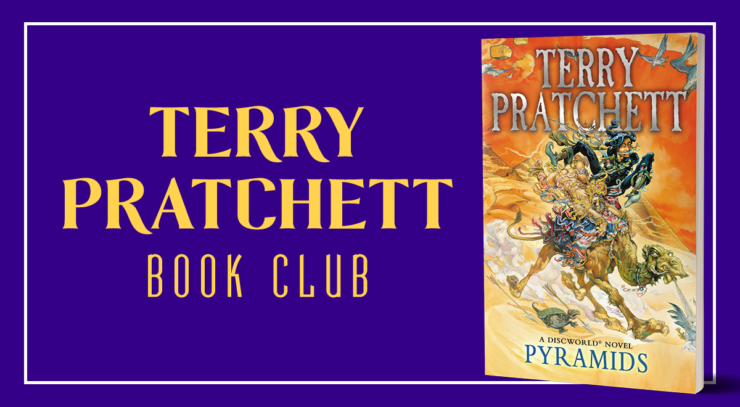Sometimes you just accidentally build a pyramid so large that it swallows an entire land via cosmic powers. It’s time for “The Book of the New Son”, part three of Pyramids.
Summary
Djelibeybi has disappeared. Well, not disappeared—Ptraci discovers you can sort of see it if you’re looking weirdly at the correct spot. But they can’t figure out how to get to it, or put it back, so Teppic decides that they’ll go to Ephebe and ask them some math questions that might get things all sorted. As they’re making their way to the country, Teppic tells Ptraci about their democratic government and elections. Ptaclusp finds the kingdom has been dragged into another dimension, and his accountant son, IIa, has fallen out of step with time and gone all flat, and where they are, their gods are also present. Teppic and Ptraci run into two Ephebians named Xeno and Ibid, who are trying to shoot tortoises with arrows. They’re philosophers, and they refer Teppic to Pthagonal for matters of geometry. But they also note that, now their border is directly up against Tsort, their countries will be going to war. They tell Teppic to come to the symposium—but Ptraci can’t come because women’s brain overheat.
Buy the Book


Victories Greater Than Death
The priests of Djel try to contend with the fact that the gods are now all real and manifest. Initially, Dios seems down for the count so Koomi decides it’s time to make a grab for power and suggests that they begin sacrificing to the gods again, in order to keep their favor. Dios comes out of his stupor, declares the king dead and asserts that he is in charge—the gods will do as he instructs. But he cannot think what to do. Meanwhile King Teppicymon awakens in his mummified body and collects a few organs before going to have a chat with Dil about what’s going on. The king isn’t too worried about the priests or the gods, or even his son (who he’s sure isn’t dead), but he is worried about all his ancestors waking like he just did. He asks Dil to grab a sledgehammer.
At the Symposium, Copolymer tells the story of the Tsortean Wars (which are basically the Trojan War), and philosophers talk while everyone proceeds not to listen, or to argue their points. Teppic notes a fellow who is not a philosopher, named Endos the Listener, who is paid to listen to all of them. He then goes to talk to Pthagonal (who is talking about his issues with pi over an actual pie), and asks him about his kingdom. Pthagonal explains that pyramids are a problem—their shape distorts time, eating up all the new time so that the kingdom is operating on past time. He explains that Djel has been sucked into a dimension at ninety degrees, and that time and space have gone all wrong there. Teppic leaves the Symposium and tells Ptraci what he’s learned, and she suggests that they leave all this behind; there’s nothing they can do about what’s happened, and they can’t get back into Djelibeybi, so they should just leave and start over. Teppic considers it, staring out at the water, when suddenly someone says his name—it’s Chidder.
Chidder gives them new clothes to wear and has them dine in his cabin. He’s very interested in Ptraci, and asks about her relationship to Teppic. He also tells Teppic that he should join their trading operation and use the kingdom as a tax haven with their offices in Ankh-Morpork. Teppic feels awful about the idea. That night he has a dream about his ancestors, in particular, the first king named Khuft. The man tells him that the stories around the founding of the kingdom were somewhat altered for PR purposes, that he was a criminal who sold shoddy camels to people. He believes that the camels themselves are the reason he found the river, and he suggests that Teppic is the only one who can decide was their future will be. Teppic awakens to find Chidder’s boat has already started out to sea, so he jumps ship. He makes it back to get his camel, but he can’t pay for his parking, and almost gets into a fight over it. He escapes and tells You Bastard they’re going home.
King Teppicymon brings Dil and Gern to break the mummies out of their pyramids; the ancestors all seem to agree that they’re not the best burial plan. Teppic and You Bastard travel a long way in the sun and once they arrive the limestone outcropping they left, he passes out from sun exposure. He comes to surrounded by Ephebian and Tsortean soldiers who are concerned over how he’s mistreated his camel, but he demands they not give him a drink of water—he wants You Bastard to find the water in Djelibeybi. They run at a rock wall and vanish, baffling two soldiers (one from each side, who chat about the conditions for their respective armies before heading back to their sides.
Commentary
This section is basically a “Who’s Who” of Greek culture and philosophy, with all the fellows at the Symposium matching up to famous names in philosophy and history and the rest. The names that Pratchett selects for his pastiched historical figures are also references unto themselves half the time—copolymer is the term for a compound plastic, and antiphon is a call-and-response phrase you get in choirs. I do like his Herodotus stand-in, and how bad he is at telling stories about the Tsortean Wars.
In this case, there’s a little more to lean on here, because we know a bit more about how the ancient Greeks lived, and Britain in particular has always been incredibly enamored of Greek culture and history. Herodotus did genuinely to go Symposiums like this and make money this way, and said Symposiums were genuinely just excuses to hang out and get drunk and argue philosophical points, and we’ve even got a listener here to play the role of the second guy in Socratic dialogues. The idea of Pythagoras being so wasted that he’s stuck on his dislike of pi is hilarious. The thought of Aesop crunching away on celery while you’re trying to talk is similarly excellent.
Outside of that, the general theme is Teppic trying to decide if he’s going to try and make it back into his kingdom and fix this mess, in addition to everything in the Djel dimension falling apart/coming to a head. Dios just can’t let go of anything. King Teppicymon is breaking his forebears out of their locked tombs. Ptaclusp is pretty unhappy with his choice of architectural focus, and is finally open to the discussion of aqueducts.
This section also gets more gender essentialist than I’m generally going to be a fan of, starting with You Bastard noting that “males and females always got along best when neither actually listened to what the other one was saying.” Which sounds oh-so droll and clever, but is really kind of exhausting because it’s untrue. (And then someone inevitably steps in to say, “well, it’s true in my experience, haha!”, which… depresses me. Please, don’t live your life deliberately not listening to other genders for the sake of smooth tides, it’s not actually funny.) And also encourages people to keep believing things like that, which is emphatically not what society needs.
Then there’s the costume change on Chidder’s boat, and the narrative makes the point about women in more clothing being more attractive than women in less clothing again for some reason? I’m surprised an editor didn’t catch that because it reads more as an error than as something pointed. Yes, we get it, it’s possible to be incredibly sexy and totally covered in fabric, but that’s not a profound musing.
Of course, it’s down to the final section to tie all of this up, but my assumption is that we’re making some points about forging your own path and not being quite such a stickler for tradition. The real obstacle to that is ultimately Dios, so we’ll see how that plays out.
Asides and little thoughts:
- There’s mention of the Catharti Death Grip in reference to Ptraci’s potential skills, and, I mean, that’s gotta be a reference to the Vulcan Death Grip, right?
- The discussion about democracy and how everyone can “vet” (vote)… excepting anyone who is not an able-bodied, law-abiding cis man, is also the topic of a song in Galavant that’s pretty great.
- There are so many terrible puns in this section, and I love me some terrible puns, but wow. “Gilt complex”, “complete Set”, and so on, it’s just a lot to contend with in such a short span.
- I have to admit, I do like the idea of a bunch of mummies just walking around collecting their relatives from pyramids. Nice change from the usual horror trope.
Pratchettisms:
He’d hated every minute of his time there. And now it had shut him out. And now, because he couldn’t, he wanted to go back.
Several of them were holding tortoises on sticks. They looked a bit pathetic, like tortoise lollies.
Belief is a force. It’s a weak force, by comparison with gravity; when it comes to moving mountains, gravity wins every time.
It must be brains, he thought manically, because semolina doesn’t squidge like that. I’ve collected my own thoughts, haha.
The Spanish use an upside-down question mark to tell you what you’re about to hear is a question; this was the kind of cough that tells you what you’re about to hear is a dirge.
Ah. Something else to remember, then. The Ephebians made wine out of anything they could put in a bucket, and ate anything that couldn’t climb out of one.
It took a little while for this to sink in, but he managed it with all the aplomb of a concrete block in a quicksand.
Next week we’re back to finish the book!










